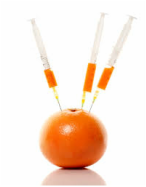LINKS: VIT. C IN THE TREATMENT OF CANCER
1. NIH Study
2. NIH Study 2
3. Article from the Journal, Oncology
4. Gliobalstoma & Vitamin C
5. Cytotoxic Effects of Vitamin C
6. Vitamin C Kills Candida
7. Vitamin C and Cancer
8. Ascorbic Acid selectively kills cancer cells
9. Intravenous vitamin C in the supportive care of cancer patients
10. NIH: Intravenous High-Dose Vitamin C in Cancer Therapy
11. Treatment of pancreatic cancer with intravenous vitamin C
12. Effect of high-dose intravenous vitamin C on inflammation in cancer patients
13. IV Vitamin C used as Chemotherapy
14. High Dose Parenteral Ascorbate Inhibited Pancreatic Cancer Growth and Metastasis
15. KU University IV Vitamin C Protocol (see below)
| uofk_cancer_protocol_ivc.pdf | |
| File Size: | 2422 kb |
| File Type: | |
IV Vitamin C ( Ascorbic Acid) (IVC)
Boost Immune Function
Used in the Treatment of Cancer - induces tumor cell apoptosis, inhibits angiogenesis, reduces inflammation,
Improves quality of life in cancer patients
Universal Antidote
Allergies, Hay-fever
Detoxification
Can lower pro-inflammatory cytokines and CRP
Improves Collagen Production
Treat Rheumatoid Arthritis
By now, most people know that vitamin C is a potent antioxidant that has the power to boost immune function, increase resistance to infection, and protect against a wide range of diseases.
But there’s an entirely different and largely unknown role of vitamin C, and that is its ability—when administered in very high doses by intravenous (IV) infusions—to kill cancer cells.
Vitamin C interacts with iron and other metals to create hydrogen peroxide. In high concentrations, hydrogen peroxide damages the DNA and mitochondria of cancer cells, shuts down their energy supply, and kills them outright. Best of all—and unlike virtually all conventional chemotherapy drugs that destroy cancer cells—it is selectively toxic. No matter how high the concentration, vitamin C does not harm healthy cells.
Why IV Administration Is Essential
The only way to get blood levels of vitamin C to the concentrations required to kill cancer cells is to administer it intravenously. The body tightly controls levels of this vitamin by limiting intestinal absorption.
IV vitamin C is not a cure-all for cancer. I do, however, believe it is one of the brightest lights on the horizon. Vitamin C may also be used in conjunction with other alternative and conventional therapies—in fact, when given on the same day as chemo, the two have synergistic effects.
Dr. Neil Riordan, a pioneer in the use of IVC is the foundation for our treatment. For more in-depth information on the IV Vitamin C protocol with clinical references, follow the links below:
1. Riordan Clinic IVC protocol
2. IVC Clinical Trials
Boost Immune Function
Used in the Treatment of Cancer - induces tumor cell apoptosis, inhibits angiogenesis, reduces inflammation,
Improves quality of life in cancer patients
Universal Antidote
Allergies, Hay-fever
Detoxification
Can lower pro-inflammatory cytokines and CRP
Improves Collagen Production
Treat Rheumatoid Arthritis
By now, most people know that vitamin C is a potent antioxidant that has the power to boost immune function, increase resistance to infection, and protect against a wide range of diseases.
But there’s an entirely different and largely unknown role of vitamin C, and that is its ability—when administered in very high doses by intravenous (IV) infusions—to kill cancer cells.
Vitamin C interacts with iron and other metals to create hydrogen peroxide. In high concentrations, hydrogen peroxide damages the DNA and mitochondria of cancer cells, shuts down their energy supply, and kills them outright. Best of all—and unlike virtually all conventional chemotherapy drugs that destroy cancer cells—it is selectively toxic. No matter how high the concentration, vitamin C does not harm healthy cells.
Why IV Administration Is Essential
The only way to get blood levels of vitamin C to the concentrations required to kill cancer cells is to administer it intravenously. The body tightly controls levels of this vitamin by limiting intestinal absorption.
IV vitamin C is not a cure-all for cancer. I do, however, believe it is one of the brightest lights on the horizon. Vitamin C may also be used in conjunction with other alternative and conventional therapies—in fact, when given on the same day as chemo, the two have synergistic effects.
Dr. Neil Riordan, a pioneer in the use of IVC is the foundation for our treatment. For more in-depth information on the IV Vitamin C protocol with clinical references, follow the links below:
1. Riordan Clinic IVC protocol
2. IVC Clinical Trials
